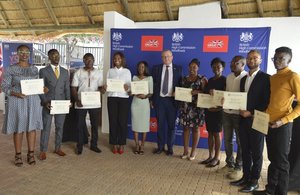High-potential tech scale-up finalists announced in Tech Awards
- Six winners will go head-to-head at the upcoming Web Summit in November 2022
- New Diversity in Tech award to be announced
- Winners to access specially-tailored UK growth package, including mentoring and support
The government’s tech scale-up programme, the Tech Rocketship Awards, has today announced its shortlisted finalists.
Seeking to identify the most innovative, fast-growing tech businesses, the awards drew entries from all corners of Europe, Israel and Turkey.
The awards identify the brightest and best tech companies and accelerates the global growth of its winners, through curated programmes connecting them with the UK’s leading ecosystem of investors, incubators and High Potential Opportunity clusters.
Previous applicants who have set up operations in the UK include companies such as Inobat, Plan A, Swapcard, Docmatic and SeeTrue AI.
Finalists:
-
5G – Neutroon (Spain). Open-API cloud platform that makes private LTE/5G and Neutral Host simple and scalable for operators and end-users.
-
Cyber Security – Facephi (Spain). Provides secure user digital identity verification and specialises in digital onboarding and biometric authentication solutions.
-
Climate Tech – Monolithos (Greece). Manufactures direct-fit aftermarket automotive catalytic converters.
-
Digital Health – Enbiosis (Turkey). Analyses the human gut microbiome using metadata and AI to provide personalised health and wellness solutions.
-
Artificial Intelligence – Jungle AI (The Netherlands). Applies AI to increase the uptime and performance of electromechanical assets such as wind turbines, solar farms or industrial production lines.
-
AgriTech – Blue White Robotics (Israel). The ‘robots-as-a-service’ platform provides solutions for building autonomous farms.
Full details about the competition, including terms and conditions are on the Tech Rocketship Awards website.)
The six selected finalists will go to the Web Summit, taking place in Lisbon from 1-4 November 2022 to pitch live to a high profile judging panel to become the Gold, Silver and Bronze winners. Winners will be announced at the UK pavilion alongside a new Diversity in Tech award for underrepresented founders.
Chris Barton, Her Majesty’s Trade Commissioner for Europe said:
There is no better place for ambitious tech companies to grow than the UK. This is the number one country in Europe for Unicorns, and UK tech VC investment is the third largest in the world. Our tech sector is the home of forward-thinking innovators, venture capital, R&D clusters and opportunities for growth across the whole of the UK.
Tech Rocketships will provide the lucky winners with a rocket-powered, fully-tailored direct route to the financiers, incubators, tech-savvy customers, and all the infrastructure needed to help them make that next great leap from ambitious scale-up to unicorn.”
Kenan Poleo, Her Majesty’s Trade Commissioner for EECAN (Eastern Europe Central Asian Network) said:
Turkish companies responded brilliantly to the Tech Rocketship Awards. I wish the finalists luck! The awards offer companies in the vibrant Turkish tech ecosystem a rocket-powered, fully-tailored direct route to the financiers, incubators, tech-savvy customers, and infrastructure needed to help them make that next great leap from ambitious scale-up to unicorn.
Ian Bowen-Morris, Head of International Marketing at the Department for International Trade said:
The GREAT Global Trade campaign is proud to support the Tech Rocketship Awards. It is a fantastic platform enabling international businesses to take advantage of the UK’s position as a world-leading destination in which to set up and scale up innovative technology companies.
Notes to editors:
- The Tech Rocketship Awards Categories are: Artificial Intelligence (AI), 5G, Agri-Tech, Digital Health, Cybersecurity, Climate Tech, with a new Diversity in Tech Award for underrepresented founders.
- Official Awards Partners are EY, Goodwille, Tech UK and Tech Nation.
